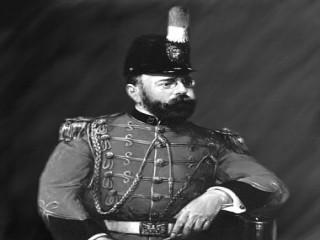
John Philip Sousa biography
Date of birth : 1854-11-06
Date of death : 1932-03-06
Birthplace : Washington, D.C., United States
Nationality : American
Category : Historian personalities
Last modified : 2011-07-11
Credited as : Composer, band leader, Romantic era
32 votes so far
"March King" John Philip Sousa was the most famous band leader in the United States during his lifetime, a former U.S. Marine Band leader who composed and conducted some of the most well-known marches in the world. His professional career began as a violinist in travelling orchestras, but his first fame came as the leader of the U.S. Marine Band from 1880 until 1892. Sousa composed the official song of the Marine Corps, "Semper Fidelis" at the request of President Chester A. Arthur (who was looking for a song to replace "Hail to the Chief," or so the story goes). In 1892 he started a civilian band that became internationally famous and hugely popular (in 1910 they toured the world). The band was known especially for marches that Sousa composed, notably "Stars and Stripes Forever," designated in 1987 as the National March of the United States.
Sousa also wrote operas and other pieces of music, as well as novels and poetry... In 1917 he enlisted in the U.S. Naval Reserve (at the age of 62) because of World War I.
Notable marches :
"The Gladiator March" (1886)
"Semper Fidelis" (1888) (Official March of the United States Marine Corps)
"The Washington Post" (1889)
"The Thunderer" (1889)
"High School Cadets" (1890)
"The Liberty Bell" (1893) (credits theme for Monty Python's Flying Circus)
"Manhattan Beach March" (1893)
"King Cotton" (1895)
"Stars and Stripes Forever" (1896) (National March of the United States)
"El Capitan" (1896)
"Hands Across the Sea" (dedicated to the band of the Virginia Tech Corps of Cadets – the Highty-Tighties) (1899)
"Hail to the Spirit of Liberty" March (1900)
"Invincible Eagle" (1901) (Dedicated to Pan-American Buffalo Exposition)
"Fairest of the Fair" (1908)
"Glory of the Yankee Navy" (1909)
"U.S. Field Artillery" (1917) (Modified version The Army Goes Rolling Along is the official song of the U.S. Army)
"Who's Who in Navy Blue" (1920)
"The Gallant Seventh" (1922)
"Nobles of the Mystic Shrine" (1923)
"The Black Horse Troop" (1924)
"Pride of the Wolverines" (1926)
"Minnesota March" (1927)
"New Mexico March" (1928)
"Salvation Army March" (1930) (dedicated to The Salvation Army's 50th anniversary in the USA)
















